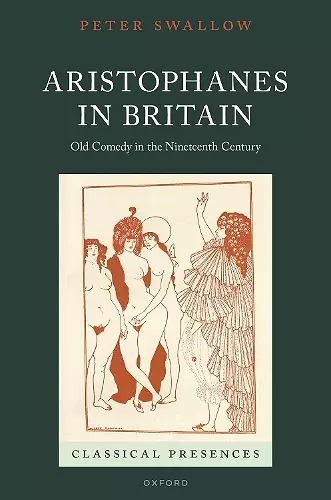Aristophanes in Britain
Old Comedy in the Nineteenth Century
Format:Hardback
Publisher:Oxford University Press
Published:11th Sep '23
Should be back in stock very soon

In this lively and wide-ranging study, Peter Swallow explores the reception of Aristophanes in Britain throughout the long-nineteenth century, setting it in the broader context of Victorian Classicism and, more specifically, the period's reception of Greek tragedy. Swallow shows the surprising extent to which Aristophanes was repurposed across an array of mediums in Victorian Britain, and demonstrates that Aristophanic reception in the period was always a process of speaking to contemporary issues--making Old Comedy new. The book examines two strands of Aristophanic reception: the political and the aesthetic. From the start of the long-nineteenth century, the British reception of Aristophanes tied into contemporary political debate, as historians, translators and commentators, and even the burlesque writer J.R. Planché activated Aristophanes in support of their own political positions. But each writer's conceptualisation of Aristophanes was as different as their political outlooks. While many writers who appropriated Aristophanes for their cause were Tories, a notable outlier is Percy Shelley, whose Aristophanic drama Swellfoot the Tyrant activated Old Comedy to argue for democratic republicanism--what we would now call a left-wing political revolution. The second strand of Aristophanic reception, which developed from around the middle of the nineteenth century, actively depoliticised Old Comedy and instead received it through an aesthetic lens. The aesthetics of Aristophanes--with an emphasis on the beautiful and the archaeological--also lay behind school and university productions of Old Comedy during this period. These strands of nineteenth-century Aristophanic reception find synthesis towards the book's conclusion. Edwardian women's receptions of Aristophanes show how activists used his plays to argue for equal educational opportunities and the right to vote. In the final chapter, Gilbert Murray and George Bernard Shaw's receptions reveal both the political and artistic potential of Aristophanes.
Aristophanes in Britain is a work that is authoritatively researched and full of compelling detail. Swallow suggests that his study represents merely a first step in a topic that deserves much deeper scholarly investigation. But this is to overlook the giant leap forward that his monograph achieves in forging a fresh sub-field in modern Aristophanic reception. The often-discordant nature of Aristophanes' satire made it harsh on nineteenth-century ears. Swallow's book demonstrates, however, how his works could be transposed into different keys throughout the century for purposes cultural and political. Despite attempts at censorship and manipulation, Aristophanes emerges in Peter Swallow's book as a figure whose savage wit remained as barbed and penetrating in nineteenth-century Britain as it had in fifth-century Athens. * Quentin Broughall, Bryn Mawr Classical Review *
ISBN: 9780192868565
Dimensions: 240mm x 160mm x 20mm
Weight: 638g
304 pages